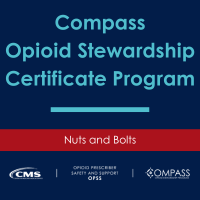
Motivational Interviewing- Part 2
Building on the foundation from Part 1, this session explores advanced applications of motivational interviewing, including responding to discord, managing sustain talk, and applying MI in complex cases such as chronic pain and opioid prescribing. Clinicians will see how MI fosters empathy, maintains therapeutic boundaries, and supports long-term behavior change.
Target Audience
Physicians
Advanced Practice Clinicians
Learning Objectives
Differentiate between change talk and sustain talk, and use MI techniques to respond effectively.
Apply strategies to address discord and resistance while preserving therapeutic alliance.
Utilize empathic listening to support patients with chronic pain and reinforce safe prescribing practices.
Integrate MI skills into ongoing clinical care, including managing controlled substances and reinforcing patient autonomy.
Don Stader, MD FACEP FASAM is a board-certified emergency and addiction medicine physician, who works at Swedish Medical Center and Lincoln Health in Colorado. Don is also the founder and Executive Director of The Naloxone Project. He is the founder and past chair of Colorado ACEP's Opioid Task Force, the Editor-in-Chief of COACEP's 2017 Opioid Prescribing & Treatment Guidelines and the CO's CURE’s guidelines on pain control and opioid stewardship. Don served for over 2 years as the Senior Pain Management & Opioid Policy Physician Adviser for the Colorado Hospital Association and serves on multiple national and local committees addressing the opioid epidemic in Colorado and across the nation, he is the current chair of ACEP’s Pain & Addiction Management Section. He is the Medical Director of the Compass Opioid Stewardship Program, a nationwide initiative to improve pain control, prescribing habits, addiction treatment and opioid stewardship for primary care clinicians.
Joshua Blum, MD is a board-certified internist and addiction medicine physician who practiced at Denver Health and Hospital Authority in Denver, CO as the director of outpatient substance use disorder treatment. As an institutional quality officer, he led initiatives on pain and opioid management and chaired Denver Health’s pharmacy and therapeutics committee. He is a past president of the Colorado chapter of the American Society of Addiction Medicine, and co-chair of the Provider Education Workgroup at the Colorado Consortium for Prescription Drug Abuse Prevention. He also serves on the boards of the Colorado Pain Society and the Harm Reduction Action Center. Dr. Blum attended Dartmouth College and the University of Southern California School of Medicine before completing his medicine residency at the University of Colorado.
Accreditation: This activity has been planned and implemented in accordance with the accreditation requirements and policies of the Iowa Medical Society (IMS). Compass Healthcare Collaborative is accredited by the IMS to provide continuing medical education for physicians.
Designation: Compass Healthcare Collaborative designates this live activity for a maximum of 1.0 AMA PRA Category 1 Credit(s)™ Physicians should claim only the credit commensurate with the extent of their participation in the activity.
Commercial Support: This activity was developed without support from any ineligible company. *The ACCME defines ineligible companies as those whose primary business is producing, marketing, selling, re-selling, or distributing healthcare products used by or on patients. Note: The ACCME does not consider providers of clinical service directly to patients to be commercial interests unless the provider of clinical services is owned, or controlled by, and ACCME defined ineligible company.
Disclosure: Compass Healthcare Collaborative (Compass) adheres to the Standards for Integrity and Independence in Accredited Continuing Education. The content of this activity is not related to products or the business lines of an ACCME-defined ineligible company. None of the planners or moderators for this educational activity have relevant financial relationships to disclose with ineligible companies whose primary business is producing, marketing, selling, re-selling, or distributing products used by or on patients.
Note: AMA PRA Category 1 Credits™ are accepted for nursing and other healthcare discipline license renewal purposes, provided the topic is relevant to the applicant’s field or discipline. After participating, you will receive a Certificate of Attendance detailing the number of AMA PRA Category 1 Credits™ you can claim. This certificate is provided for self-reporting requirements and must be submitted to your state board for license renewal.
Available Credit
- 1.00 AMA PRA Category 1 Credit™

 Facebook
Facebook X
X LinkedIn
LinkedIn Forward
Forward